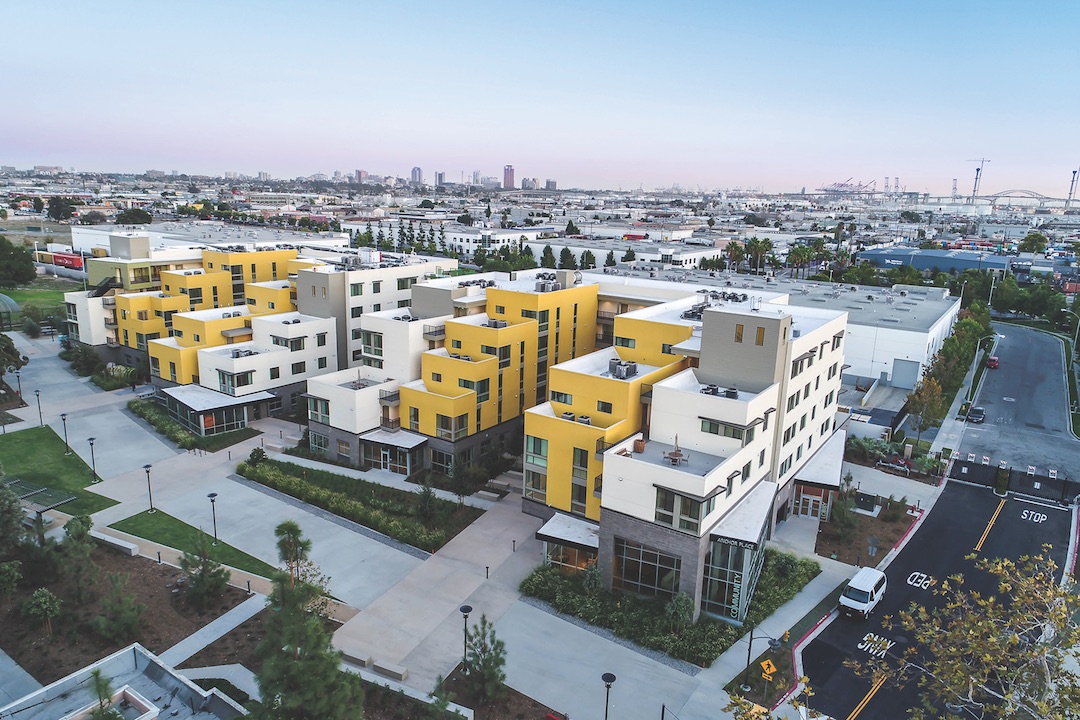The Gold Nugget Awards, known as the “Academy Awards” of residential development, are open to builders, developers, designers, and land planners with projects in the U.S. and around the world. From among the 45 projects that were honored at the Pacific Coast Builders Conference in June, we picked four outstanding Grand Award winners in affordable multifamily housing.
Social priorities shape workforce housing
Five88
>100 units/acre
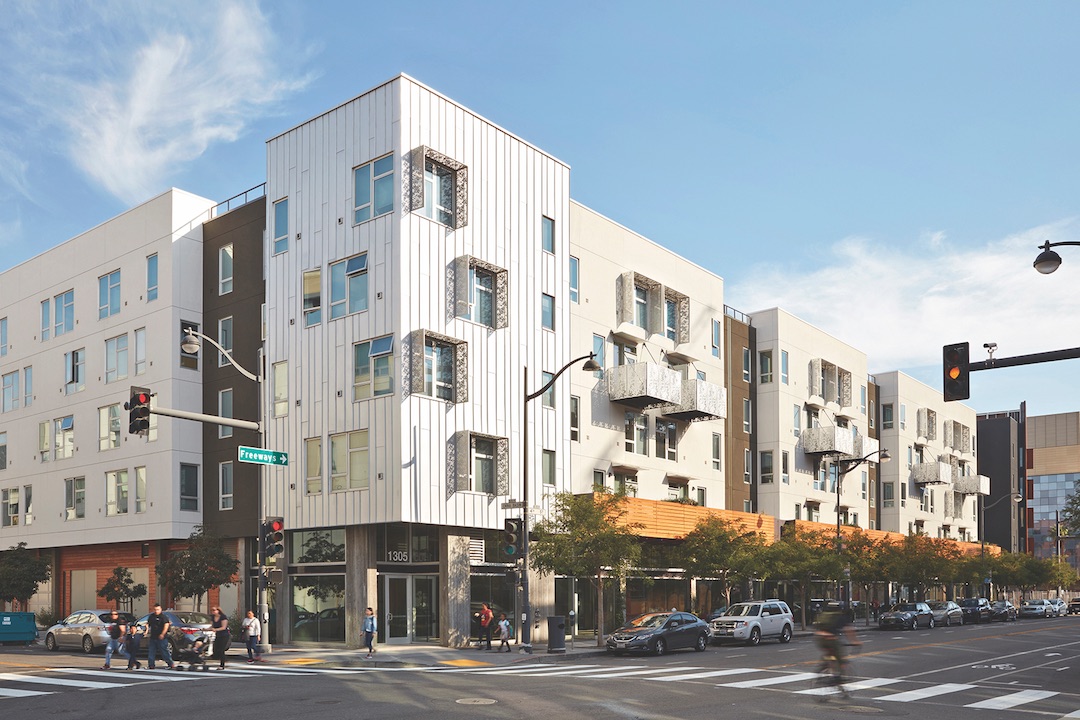 Mariko Reed.
Mariko Reed.
FIVE88 gives priority for affordable workforce housing to residents who work at public education and healthcare institutions and applicants who live or work in San Francisco. Located in a rapidly developing neighborhood near the new UCSF Medical Center, it is the largest 100% affordable development in the city in the last 10 years.
FIVE88 steps down from four stories at the west side of the block to three stories toward the east. It provides 200 apartments—72 one-bedroom residences ($1,090 to $1,320/month) and 128 two-bedroom flats ($1,299 to $1,576/month)—plus 10,079 sf in a retail arcade.
The building wraps around a large communal open space. A second-level courtyard sits atop an embedded garage on the west side and a ground-level courtyard on the east.
FIVE88 earned a Gold GreenPoint rating. Sustainable strategies include domestic solar hot-water panels and drought-tolerant landscaping. As a coastal landfill site, the project required extensive settlement strategies: surface pavers, foundation piles, and tilting stairs at stoops. The project is located along the Fourth Street bicycle route, so the designers set aside 200 secure bicycle parking spaces plus visitor bicycle parking.
PROJECT TEAM | FIVE88
OWNER Related California NONPROFIT DEVELOPER Chinatown Community Development Center ARCHITECT/INTERIOR ARCHITECT David Baker Architects ASSOCIATE ARCHITECT G7A | Architecture + Urban Structural Engineer DCI+SDE Engineers Ce Freyer & Laureta MECHANICAL ENGINEER Tommy Siu and Associates ELECTRICAL ENGINEER Alfa Tech GEOTECHNICAL ENGINEER Rockridge Geotechnical SUSTAINABILITY CONSULTANT Bright Green Strategies LANDSCAPE ARCHITECT GLS Landscape | Architecture CM Construction Resource Management GC Nibbi Brothers General Contractors
It's family living with a scenic falir
Hoa Mai gardens
60-100 units/acre
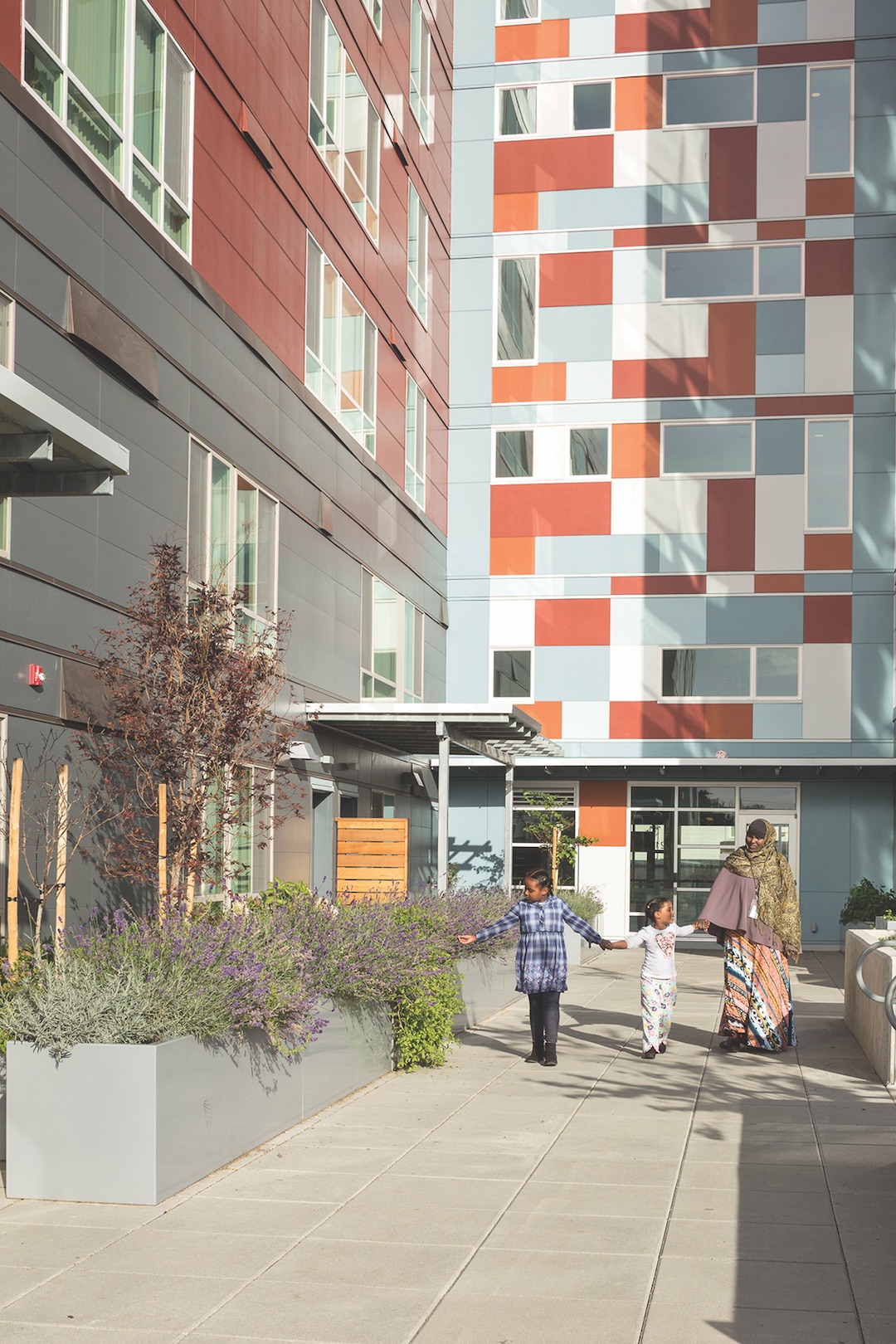 Photo: William Wright Photography.
Photo: William Wright Photography.
Thanks to its L-shaped design, Hoa Mai Gardens offer its residents an impressive scenic lineup: Elliott Bay, the Cascade Mountains, and Mount Rainier. The 111-unit, family-oriented affordable housing complex is the third building in the redevelopment of Seattle’s Yesler Terrace. The property is sited on a steep slope with a risk of landslide, necessitating extensive site stabilization.
The 146,425-sf complex has 51 one-bedroom, 43 two-bedroom, 12 three-bedroom, and five four-bedroom units. The four-bedroom townhome units provide enough space for multigenerational families. All residences are subject to LIHTC rental limits; 70 receive project-based Section 8 subsidy. Average rent: $445/month.
The community has plenty of family-friendly features: a library, units with in-home daycare capability, on-site social and youth services, a 4,014-sf courtyard, outdoor playgrounds, a green roof deck, gardens, and sewing classes.
Hoa Mai Gardens meets the state’s Evergreen Sustainable Development Standard. Its building systems use no fossil fuels. Sustainability features include solar hot water preheat, rainwater harvesting (by Water Control Corp.), and graywater piping systems for toilet flushing. A pedestrian path on the west side connects the project to the Yesler Terrace neighborhood’s network of walking/bicycling paths.
PROJECT TEAM | HOA MAI GARDENS
DEVELOPER Seattle Housing Authority ARCHITECT SMR Architects SE/CE Coughlin Porter Lundeen GEOTECHNICAL GeoEngineers Inc. DEVELOPMENT ENGINEER MIG|SvR BUILDING ENVELOPE JRS Engineering MECHANICAL DESIGN-BUILD CONTRACTOR Auburn Mechanical ELECTRICAL DESIGN-BUILD CONTRACTOR Valley Electric MEP DESIGN-ASSIST/ENERGY MODELING/COMMISSIONING Glumac SUSTAINABILITY CONSULTANT O’Brien & Co. ENVIRONMENTAL CONSULTANT Soundearth Strategies ACCESSIBILITY CONSULTANT Karen Braitmayer, FAIA ACOUSTICS SSA Acoustics PERMITS Permit Consultants NW LANDSCAPE ARCHITECT Fazio Associates GC Andersen Construction
Safe harbor for homeless veterans and families
Anchor Place
30-60 units/acre
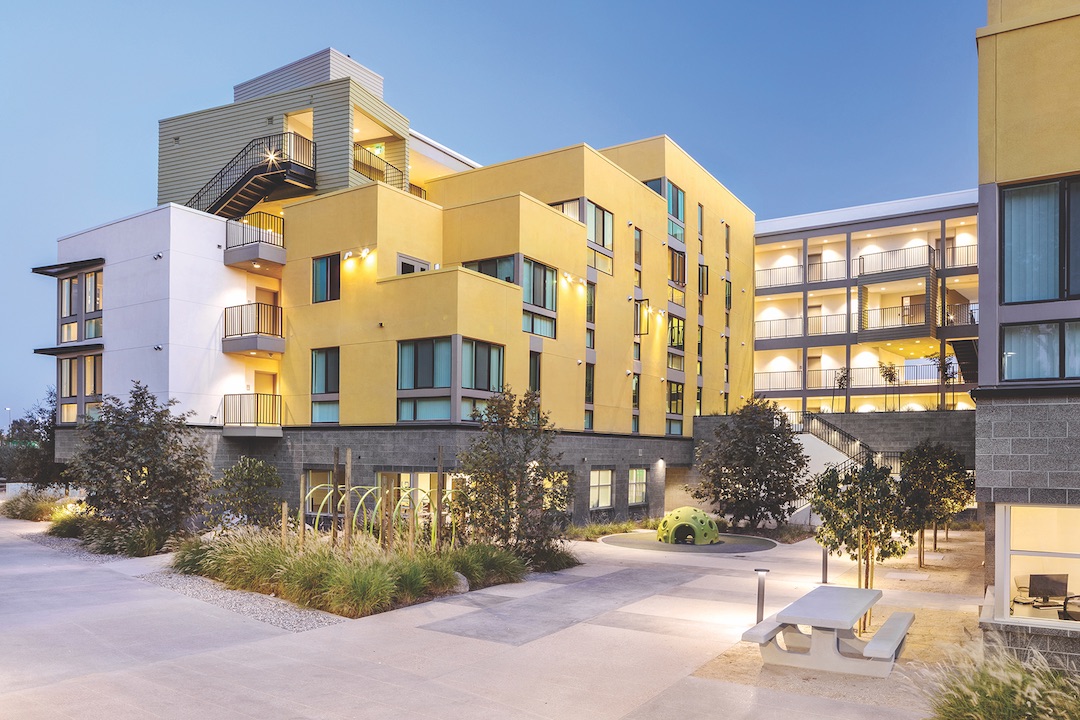 Photo: Panic Studio LA.
Photo: Panic Studio LA.
Anchor Place provides affordable housing for homeless veterans and families. Built as the second phase of the Century Villages at Cabrillo, a 27-acre campus on the site of the decommissioned Long Beach (Calif.) Naval Station, the 120-unit community has 75 apartments set aside for homeless vets and 18 units for homeless families and individuals earning 30-60% of AMI. Rents range from $507 to $845/month for the 95 one-bedroom units; $608 to $1,216 for the 20 two-bedroom units; and $703 to $1,406 for the five three-bedroom residences.
The community has social services offices, a fitness room, laundry rooms, a bike center, a yoga/dance studio, a two-story community room, and a game room. Outdoors, there’s a community garden and three courtyards: one for kids, one for solitude, one for socializing.
In total, the project offers 10,000 sf of community space. It achieved LEED for Homes Platinum status.
PROJECT TEAM | ANCHOR PLACE
OWNER Century Affordable Development, Inc. ARCHITECT The Architects Collective INTERIOR DESIGNER Collaborative House SE David Choy & Associates CE KPFF Consulting Engineers MECHANICAL/ELECTRICAl engineer S.Y. Lee Associates SUSTAINABILITY CONSULTANT Global Green LANDSCAPE ARCHITECT RELM CM Primus GC Walton Construction Services
Multigenerational living 'reimagines' vacant church site
Wesley village
<30 units/acre
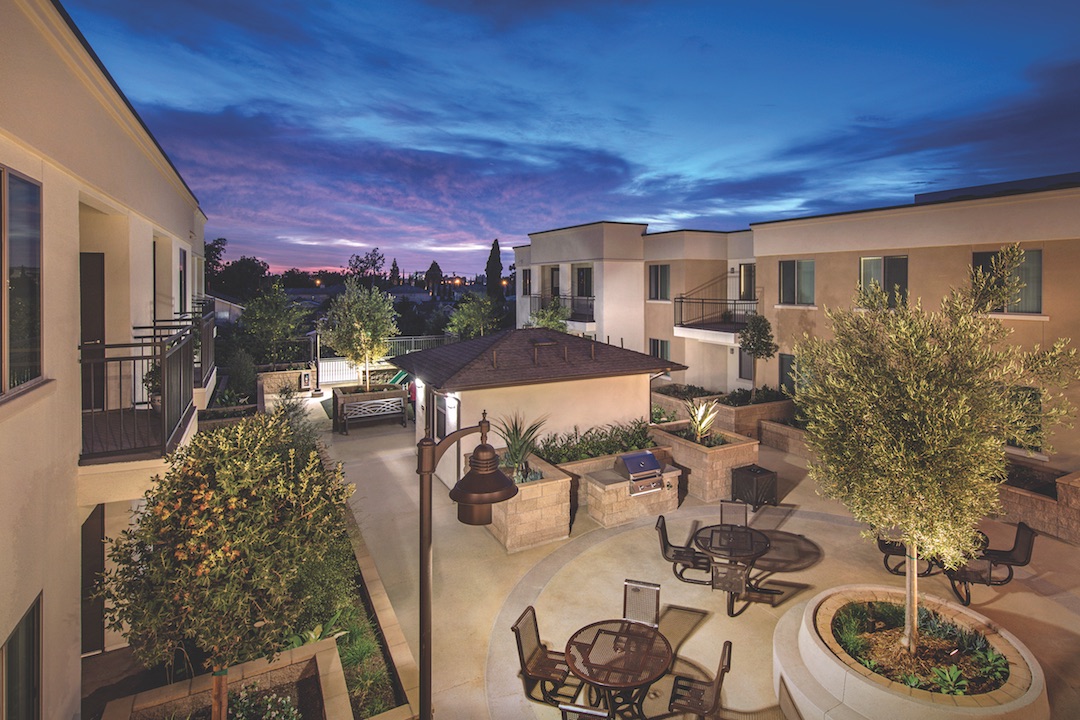 Photo: Juan Tallo.
Photo: Juan Tallo.
Wesley Village, a mixed-use community in Orange County, Calif., features multigenerational housing for families and seniors. The community was built in partnership with the 141-year-old Garden Grove United Methodist Church, the city of Garden Grove, and nonprofit developer Jamboree on the site of a vacant parking lot and unused church land. Wesley Village provides affordable housing for 47 families and seniors, along with 10,000 sf of active open space.
The complex, part of the city’s Re:Imagine Garden Grove program, is formed by two three-story residential buildings—one for seniors (16 units), one for working families (31 units)—and a third building that houses a Head Start learning center, a Boys and Girls Club, an Alzheimer’s care service, the Lestonnac Free Clinic, Project Hope Alliance, and other free educational, health, and wellness services.
A community recreation center has offices, a health clinic, a computer center, a library, and multipurpose rooms. The complex has 20 one-bedroom (813 sf), 11 two-bedroom (885-932 sf), and 15 three-bedroom units (1,126 sf). Wesley Village achieved Gold certification under LEED for Homes.
PROJECT TEAM | WESLEY VILLAGE
DEVELOPER Jamboree ARCHITECT/LAND PLANNER Newman Garrison + Partners INTERIOR DESIGN Collaborative House Structural engineer Wright Engineers MECHANICAL/PLUMBING ENGINEER TAD ELECTRICAL Candela LANDSCAPE ARCHITECT Site Design Studio GC Quality Development and Construction
Related Stories
Urban Planning | Jun 15, 2023
Arizona limits housing projects in Phoenix area over groundwater supply concerns
Arizona will no longer grant certifications for new residential developments in Phoenix, it’s largest city, due to concerns over groundwater supply. The announcement indicates that the Phoenix area, currently the nation’s fastest-growing region in terms of population growth, will not be able to sustain its rapid growth because of limited freshwater resources.
Multifamily Housing | Jun 15, 2023
Alliance of Pittsburgh building owners slashes carbon emissions by 45%
The Pittsburgh 2030 District, an alliance of property owners in the Pittsburgh area, says that it has reduced carbon emissions by 44.8% below baseline. Begun in 2012 under the guidance of the Green Building Alliance (GBA), the Pittsburgh 2030 District encompasses more than 86 million sf of space within 556 buildings.
Industry Research | Jun 15, 2023
Exurbs and emerging suburbs having fastest population growth, says Cushman & Wakefield
Recently released county and metro-level population growth data by the U.S. Census Bureau shows that the fastest growing areas are found in exurbs and emerging suburbs.
Engineers | Jun 14, 2023
The high cost of low maintenance
Walter P Moore’s Javier Balma, PhD, PE, SE, and Webb Wright, PE, identify the primary causes of engineering failures, define proactive versus reactive maintenance, recognize the reasons for deferred maintenance, and identify the financial and safety risks related to deferred maintenance.
Mixed-Use | Jun 12, 2023
Goettsch Partners completes its largest China project to date: a mixed-used, five-tower complex
Chicago-based global architecture firm Goettsch Partners (GP) recently announced the completion of its largest project in China to date: the China Resources Qianhai Center, a mixed-use complex in the Qianhai district of Shenzhen. Developed by CR Land, the project includes five towers totaling almost 472,000 square meters (4.6 million sf).
Mixed-Use | Jun 6, 2023
Public-private partnerships crucial to central business district revitalization
Central Business Districts are under pressure to keep themselves relevant as they face competition from new, vibrant mixed-use neighborhoods emerging across the world’s largest cities.
Multifamily Housing | Jun 6, 2023
Minnesota expected to adopt building code that would cut energy use by 80%
Minnesota Gov. Tim Walz is expected to soon sign a bill that would change the state’s commercial building code so that new structures would use 80% less energy when compared to a 2004 baseline standard. The legislation aims for full implementation of the new code by 2036.
Student Housing | Jun 5, 2023
The power of student engagement: How on-campus student housing can increase enrollment
Studies have confirmed that students are more likely to graduate when they live on campus, particularly when the on-campus experience encourages student learning and engagement, writes Design Collaborative's Nathan Woods, AIA.
Multifamily Housing | Jun 1, 2023
Income-based electric bills spark debate on whether they would harm or hurt EV and heat pump adoption
Starting in 2024, the electric bills of most Californians could be based not only on how much power they use, but also on how much money they make. Those who have higher incomes would pay more; those with lower incomes would see their electric bills decline - a concept known as income-based electric bills.
Multifamily Housing | May 30, 2023
Boston’s new stretch code requires new multifamily structures to meet Passive House building requirements
Phius certifications are expected to become more common as states and cities boost green building standards. The City of Boston recently adopted Massachusetts’s so-called opt-in building code, a set of sustainability standards that goes beyond the standard state code.


